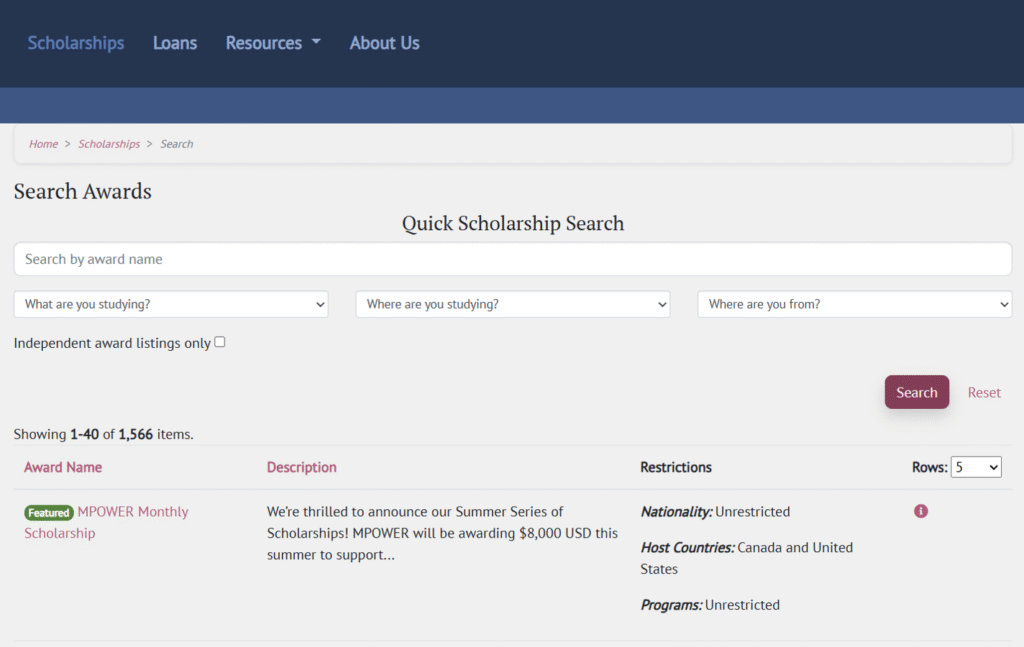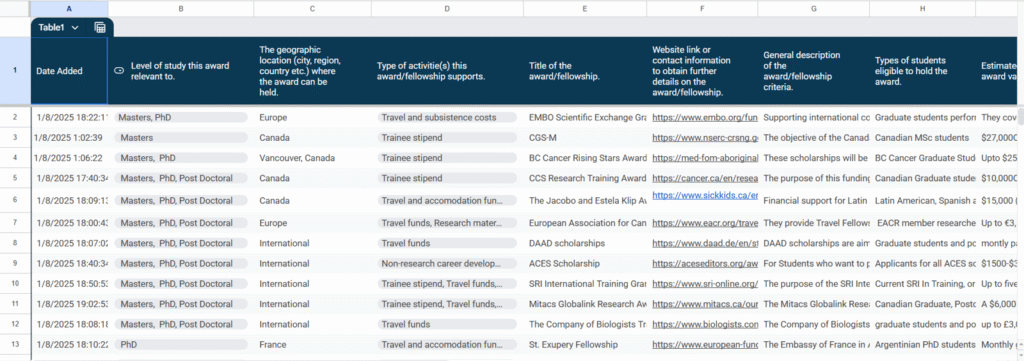
I recently co-wrote an article with my friend Simon on why I believe every student can get a scholarship.
> Still, the next question is: Which scholarship should you pursue?
To explore this, I spent some time browsing different websites to see whether they were actually useful.
My conclusion: yes, they can be very valuable in your search. However, success requires the right mindset.
Let me share the platforms I found helpful, along with some tips on how to navigate them:
Which Platforms exist
Based on my experience, I would categorize these platforms into three types:
- Broad – platforms listing scholarships from all over the world
- Focused – platforms listing scholarships only in the U.S. or from one specific program or university
- Hybrid – platforms that list scholarships alongside loans or travel opportunities
In my experience, most of them cover scholarships across several fields, not just science. That’s not a problem, though, since most platforms provide filters to help you narrow down to your specific field.
Of course, there are many such websites and databases. The key is to find those that are (A) recently updated and (B) enjoyable for you to navigate.
Further below, I share some curcial tips to use these platforms effectively. However, at first I want to give you the list of platforms that I found interesting – along with a short description of what you’ll find there:

Broad Platforms
International Scholarships
A simple but practical website. You can filter scholarships by subject, study destination, and country of origin.
Scholars4Dev
This site lists a wide range of scholarships. While the interface isn’t the most modern, the detailed descriptions and explanations are a real strength. They not only help you evaluate each opportunity but can also inspire you by showing the different types of funding that exist.
IEFA Scholarships
Clear layout with a strong filtering function. You can search scholarships by the region where you want to study as well as your home country.
Global Scholarships
The site has a nice design and often links directly to the official program or scholarship pages. However, some information can be confusing or occasionally inaccurate, so double-check details.
Program-Based
Erasmus+
One of the largest funding programs in Europe. Erasmus and Erasmus+ offer a wide range of opportunities for students from and within the EU, covering study, internships, and exchanges.
Country-Based
Scholarships.com
A well-organized site with a clean design. It even offers weekly email updates. The main limitation: it only covers scholarships in the U.S.
EduCanada Scholarships
If you’re from Canada or want to study there, this is a good place to start. You can filter scholarships by eligibility, though it doesn’t specifically highlight science-focused options.
Campus France
The official portal for scholarships and bursaries for studying in France.
University-Based
LMU Munich Scholarships
Scholarship opportunities specifically for international students at LMU Munich.
Oxford University Scholarships
A comprehensive A–Z listing of scholarships for graduate students at Oxford.
Hybrid Platforms
Pathways to Science
Focused on opportunities in the U.S., this platform is especially strong for STEM students. It includes not only scholarships but overall resources and program information.
GoAbroad & GoOverseas
A broad platform for searching experiences abroad—whether study, internships, or travel-related opportunities.
Bonus
IUBMB & IUBMB TI
Many research organizations provide a number of scholarships, so does the IUBMB. Also, the previous IUBMB TI Chair Cathy invited all Trainees to add scholarships from their institutions in order to create a list of trustworthy opportunities. It is still a work in progress, but you can visit it here.

In my opinion, these platforms an easily overwhelm you without the right approach. Here is my experience:
Tips for Handling the Platforms
Most platforms host more scholarships than you will ever be able to apply for.
> Therefore, your mindset is the key factor that decides whether you can get value from any platform.
My number one tip: patience.
If you had seen me during my first searches, you would have laughed (or had a stroke). I’d open a page and immediately click around—“Where’s the filter? Click, click… oh no, wrong tab, scroll up, click back, forward, search again… wait, wasn’t that in the other tab? Open it again…”
I wanted to get things done quickly, just like you probably do. But the better approach is to take a breath and get an overview first. Let’s be honest—what feels like “I will waste hours” usually turns out to be just five minutes if you actually used a stopwatch.
The same applies to taking notes. It feels tedious and unnecessary, but otherwise you’ll end up doing the same search three times because your working memory simply cannot handle all the information presented.
No doubt, not all platforms have the filters you’d wish for, so don’t get intimidated if you suddenly see 76 results. Start filtering step by step. As outlined before: eliminate the ones that clearly don’t fit. Then move on to eligibility, and so on.
My second tip: coolness.
Unfortunately, some platforms will make the task of finding a scholarship seem impossible: words you don’t know, links that don’t work, descriptions that don’t make sense.
Stay cool. No matter how amazing an opportunity seems, it is not the only one. Trust me. And no matter how overwhelming it feels, don’t give in.
Here is what I would advise:
- Slang or jargon you don’t know – ask ChatGPT or Google, and keep a glossary of these terms.
- Outdated information – always check the program’s official website.
- Inaccuracies – for example, some platforms list “Free Tuition” options for internationals as if they were scholarships (they’re not). If something seems odd, just check the entry on another platform or Google it to verify.
It can, and probably will, be frustrating, but remember: the academic system is messy. It’s not always the platform’s fault—sometimes it’s the programs or institutions themselves. For example, I once found this on a German university website:
“There are no tuition fees at the University of Würzburg.
But all students have to pay a semester contribution of €168.50 before they can be enrolled (Breakdown: Student Services fee: €72.00 + semester ticket: €96.50).”
So basically, there are fees—just not tuition fees. Fair, but initially confusing.
In essence: Use these platforms as a faster Google. Don’t expect too much, and don’t get FOMO (Fear of Missing Out). In the end, they open the door to endless opportunities that you would otherwise only discover if you searched the website of every single university and scholarship program worldwide.
Written by Patrick Penndorf
Biochemist and recipient of the one or other scholarship ; )

I will right away seize your rss feed as I can’t to find your e-mail subscription link or e-newsletter service. Do you’ve any? Kindly allow me recognize in order that I may subscribe. Thanks.